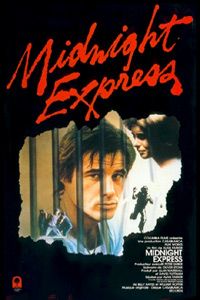Based on Billy Hayes book of the same title, adapted to the screen by Oliver Stone, Alan Parker’s Midnight Express divided critics due to its sensationalist elements and uneven (distorted?) treatment of the real-life case upon which the movie is based.
The title of the film is a jargon for inmates’ attempt to escape, and indeed, the movie works best as a thrilling prison melodrama, claiming similar appeal that other jail features, such as Papillon had.
Punctuated by brutal and horrific action scenes, the drama is accompanied to the exhilarating disco music of Giorgio Moroder, which won an Oscar and became a hit.
As a young student, Hayes was sent to a brutal prison for trying to smuggle Hashish out of Turkey. The movie, which is manipulative in both the positive and negative senses of this term, differs substantially from the book’s account, particularly in its stereotypical portraiture of most of the Turkish characters, not only the authorities; Billy Hayes himself was critical of the picture.
On October 6, 1970, after staying in Istanbul, Billy Hayes is arrested by Turkish police, on high alert due to fear of terrorist attacks, as he is about to fly out of the country with his girlfriend. After finding bricks of hashish taped to his body, he is sentenced to four years and two months in jail, charged with drug possession. In 1974, after a prosecution appeal, his initial sentence is overturned by the Turkish High Court in Ankara, and he is ordered to serve a 30-year term. Horrific scenes of physical and mental torture follow in a prison governed by bribery, violence and insanity. Ruthless wardens cruelly force the prisoners to the worst brutalities, and some prisoners work for the prison administration as ‘informers’.
Billy bites off the tongue of a prison informant who has notified the warden of his escape plan. In 1975, after being committed to the prison’s insane asylum, Billy again tries to escape, this time by attempting to bribe the chief warden. He ends up accidentally killing the warden, as the latter wanted to rape him, and Billy puts on an officer’s uniform and escapes by walking out of the front door.
The epilogue states that on October 4, 1975, he crossed the border to Greece, and arrived home three weeks later.
The movie contains some powerful interaction scenes between Billy and the other Western inmates, an assorted aggregate of colorful types, including the slightly demented American Jimmy (Randy Quaid), the drug addict British Max (John Hurt), the Scandinavian Erich (Norbert Weisser), a sensitive gay man with whom Billy has a sexual liaison.
As noted, there were major differences between the book and the screen versions of “Midnight Express.” In the movie, Billy Hayes is in Turkey with his girlfriend, Susan (Irene Miracle), whereas in the original story, he was by himself; the love story features prominently in the melodramatic movie.
The rape scenes are also fictional: Hayes never claimed to have been raped by Turkish wardens, and while he engaged in consensual sex, the film depicts him rejecting the advances of prisoners and wardens.
Moreover, Hayes never engaged in the violent fight scene that was depicted. While in the narrative, the protagonist is moved to another prison, from which he escaped by sea, in the movie, there’s a violent scene in which he kills the warden while the latter is about to sexually molest him.
Though the story is set in Turkey, Midnight Express was largely shot in Malta, after permission to film in Istanbul was denied. Background imagery of Istanbul was provided by a small crew pretending to shoot footage for a commercial.
There’s strong acting across the board, particularly by Brad Davis in the lead, and John Hurt and Randy Quaid in the supporting roles, which makes up for the narrative shortcomings and the factual inaccuracies.
Oscar Nominations: 7
Picture, produced by David Putnam and Alan Marshall
Director: Alan Parker
Supporting Actor: John Hurt
Screenplay (Adapted): Oliver Stone
Cinematography: Michael Seresin
Editing: Gerry Hambling
Score: Giorgio Moroder
Oscar Awards:
Screenplay
Score
Oscar Context:
he Oscar Awards in 1978 were split between two Vietnam pictures: Michael Cimino’s “The Deer Hunter” and Hal Ashby’s “Coming Home.” The other two Best Picture nominees were Warren Beatty’s comedy-fantasy “Heaven Can Wait,” and Paul Mazursky’s zeitgeist feminist melodrama “An Unmarried Woman












